We all know the paranoia we get when we hand over our personal information to a website. We think, “What if they sell my data?” or “What if this website is hacked and my information is leaked?”
These are valid concerns; hence, many people have turned to DuckDuckGo as their go-to search engine in recent years. With DuckDuckGo, you don’t have to worry about your privacy. In this detailed review, we’ll take a look at what makes DuckDuckGo so great and how it can benefit you.
DuckDuckGo quick review
| Our rating | 9/10 |
| Encryption | Yes |
| Pricing | Free |
| No-logs | Yes |
| Money-back guarantee | Free |
Pros and cons of DuckDuckGo
- Great reputation for being a privacy-focused search engine
- Leak protection
- No profiling
- Offers encryption for additional protection
- Intuitive user interface
- Based in the US
- Depends on other search engines to show search results
What is DuckDuckGo?
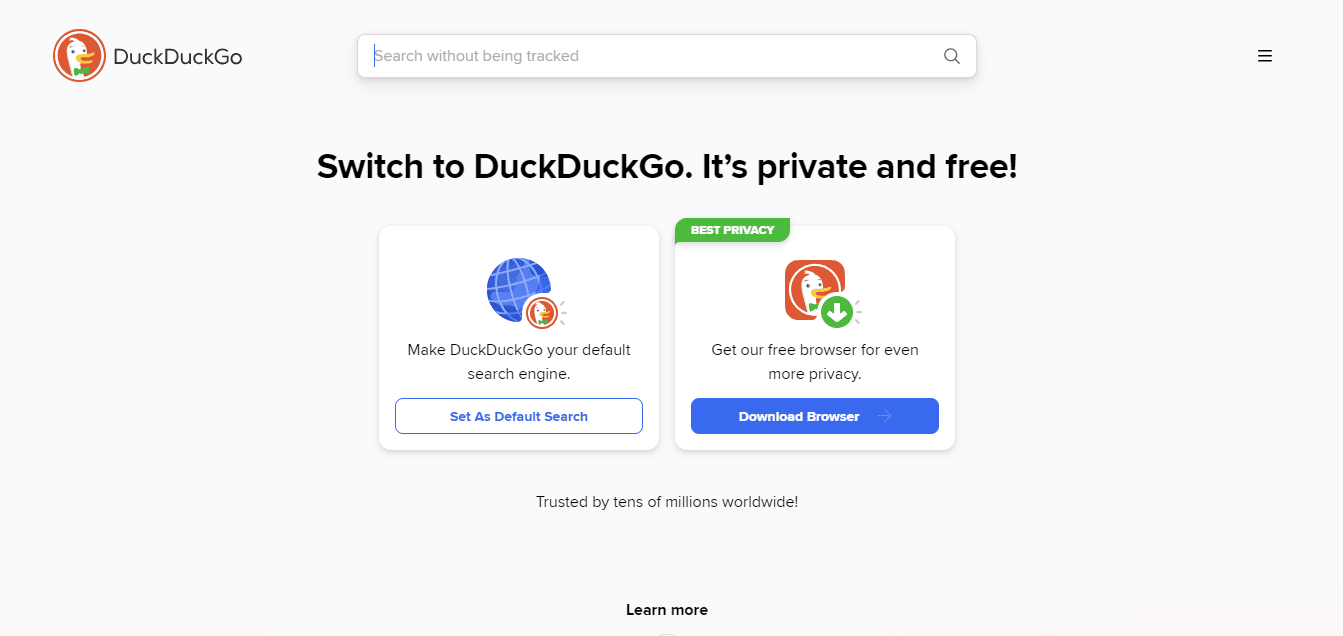
DuckDuckGo is a member of a relatively new breed known as private search engines. Our term “private” refers to them as opposed to the market leader, Google. In addition to collecting data on users, Google has a poor reputation regarding privacy.
Google tracks everything you search for and click on while using their site. They then use this data for the following reasons.
- Targeted advertising
- Location tracking
- Improving usability
- Tweaking algorithms
- Trendspotting and analysis
- To show targeted ads
DuckDuckGo, on the other hand, does not collect any user data. That means they can’t sell your data to advertisers or use it to target you with ads. In addition, DuckDuckGo doesn’t store your search history. So, even if their site gets hacked, hackers would have no user data to exploit.
As a result, DuckDuckGo is becoming increasingly popular. Because of convenient giants such as Google, this private search engine gained popularity slowly. Nevertheless, it has about 80 million monthly users, which is good.
DuckDuckGo privacy features
As a privacy-focused search engine, DuckDuckGo has several features that set it apart from other search engines like Google, Bing, and Yahoo.
1. No user tracking
DuckDuckGo does not track its users. That means it doesn’t store your search history, IP address, or other personal information. In addition, the private search engine blocks all third-party cookies by default.
Along with this data protection, DuckDuckGo can prevent “search leakage.” Specifically, it redirects your search request instead of sharing your private information with the search engine and every website you visit. As a result, websites are unable to know who searched what from where.
The default version of this search engine does not save cookies; however, this feature is customizable. For example, you can have your browser save cookies from DuckDuckGo to log in to websites such as Gmail or Facebook.
2. Advanced encryption

With DuckDuckGo’s extensions and mobile app, you can access Smarter Encryption. It will prioritize your device to accept more encrypted connections and prevent unencrypted connections.
DuckDuckGo continuously maintains a list of all the websites that support encryption. When you visit a site, the search engine automatically uses the encrypted version.
Using this feature, you can ensure that you are visiting the HTTPS version of a website. You will be protected from prying eyes using an encrypted HTTP connection instead of an unsecured one.
3. Anonymous localized results
DuckDuckGo can protect your personal information. Using a GEO::IP lookup, it guesses your current location and removes it from its database.
Giving a search engine your location is beneficial, even though it can be nerve-wracking. Depending on your location, you may need to access localized results like weather or business listings.
There will be times when you’ll need more accurate results. DuckDuckGo will prompt you to enable location if it needs more information about your location to give you the results you’re looking for. It can help you get more relevant results without sacrificing your privacy.
4. Fire Button feature
All tabs will close by tapping the Fire Button, and browsing data will be wiped. As a result, you can easily protect your privacy by clicking just once before walking away.
The Fire Button feature is available in the DuckDuckGo extension and iOS app. If you delete this information (press the Fire Button), DuckDuckGo will not store any data on your device. So, your information remains protected, and you can have more control over it with this extra security measure.
5. CSP (Content Security Policy) reports
The private search engine uses a standard computer security specification called a Content Security Policy to protect users and ensure a bug-free web search experience.
A DuckDuckGo CSP tells the browser which resources on “duckduckgo.com” it may trust, fetch, and execute (e.g., images, JavaScript code, etc.).
It enables the search engine to detect and block intentionally harmful third-party attacks like XSS (cross-site scripting), clickjacking, and code injection attacks.
There may be times when DuckDuckGo makes additional requests to duckduckgo.com/csp_report.js or duckduckgo.com/csp_report_ed.js. According to DuckDuckgo, this allows the search engine to determine whether legitimate resources are failing to load and to validate that DuckDuckGo is deploying the latest CSP updates.
CSPs can protect you from the following cyberattacks:
- Cross-site scripting (XSS) attacks: Attacks that inject client-side scripts into your browser.
- Code injection attacks: A code injection that redirects the actions of your browser or application.
- Clickjacking: A malicious program tricks you into clicking on something that can reveal your personal information or allow hackers to access your computer.
6. Privacy Grade
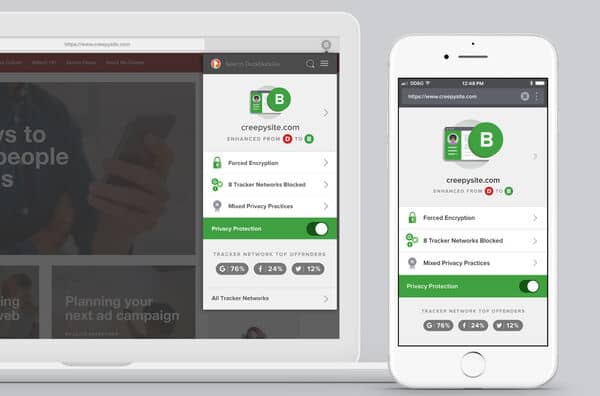
DuckDuckGo has a Privacy Grade feature, available through its browser extension and mobile app. By identifying when a website tracks your data and warning you, Privacy Grade helps you protect your privacy online.
Privacy Grade is automatically activated whenever you visit a website on DuckDuckGo. After scanning the website, the feature assigns a privacy grade from “A” to “F,” with “A” being the safest.
These grades are given based on the following factors.
- Trackers: The number of trackers DuckDuckGo is blocking from the site
- Connection: The number of secure encrypted connections to the site.
- Privacy practices: How well a website maintains its Privacy Policy and TOS.
DuckDuckGo will show you how your privacy has been enhanced if it blocks specific trackers or encrypts your connection on a particular website. DuckDuckGo displays both the current Privacy Grade and the original letter grade.
A bar will appear with “Enhanced from __ to __” (e.g., “Enhanced from E to B”). According to DuckDuckGo’s privacy features, the first grade in red represents the original grade, and the second grade in green represents the adjusted grade.
7. Privacy Essentials browser extension
DuckDuckGo offers a browser extension in addition to its standard search engine – the Privacy Essentials Extension. It protects Firefox, Chrome, and Safari users from web tracking.
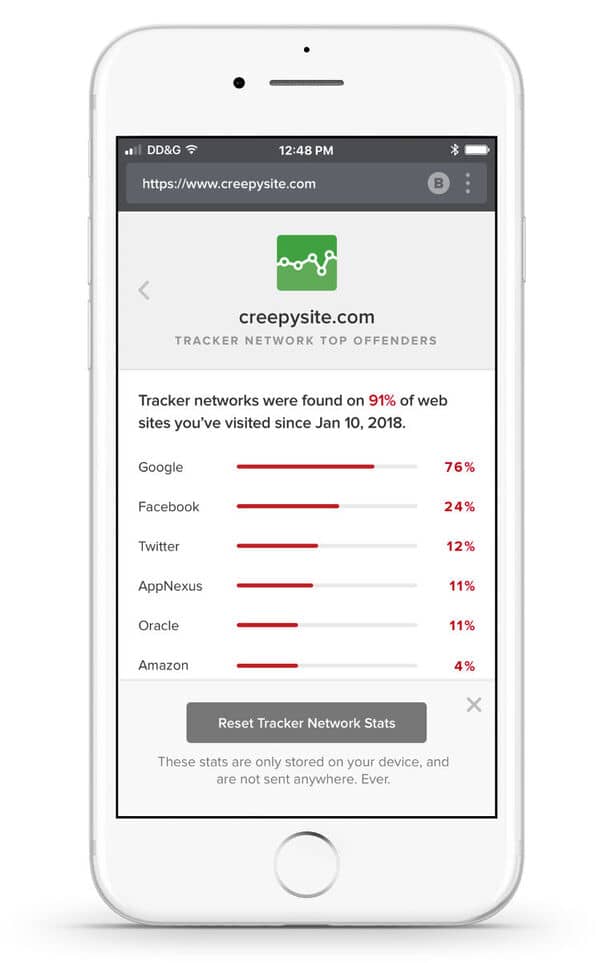
Once you install the extension, it will block known trackers and give you a Privacy Grade for each website you visit.
You can enable several options in the extension’s settings, such as encryption, email protection, and Global Privacy Control (GPC).
This extension protects your online privacy without tracking you unexpectedly. With DuckDuckGo Privacy Essentials, your data remains protected against fingerprinting, social tracking, Google AMP, and third-party cookies, just like the search engine.
8. No stored search history
DuckDuckGo does not store your search history like other search engines. Since its servers do not store your past searches, so no one can access them.
However, your browser may save a record of your visited pages – even if you have Global Privacy Control enabled. You can easily change this via browser settings.
ISPs are another entity that may keep records of your visited sites. Thus, we recommend using a VPN service if you’re concerned about your privacy.
9. No profiles
Based on your online behavior, search history, age, gender, IP address, and browser cookies, most search engines create a profile of you.
DuckDuckGo does not create user profiles based on your searches. That means it does not use your search history to personalize your results on every search.
Another benefit of this feature is that it eliminates filter bubbles. When you get stuck in a “filter bubble,” search engines prioritize your search results by your user profile. Since filter bubbles can limit your searches, browsing without a user profile can provide complete and accurate results.
DuckDuckGo privacy concerns
DuckDuckGo has been criticized for several privacy concerns.
One major concern is that this browser is not as private as they claim. Some tests have shown that DuckDuckGo sends some data to Microsoft (as an exception found for Microsoft trackers), even when the user is not logged in. The company has tackled this issue to some extent, but privacy-oriented users still believe in this service because of its strong reputation for being privacy-focused.
Another concern is that the search engine uses affiliate links for some searches. That means if you click on a product link and then purchase something from the site, DuckDuckGo will earn a commission.
Some users are concerned that this could incentivize DuckDuckGo to show results that are not necessarily the most relevant.
Finally, some people worry that because DuckDuckGo is not as well-known as Google, it could be a target for hackers.
Despite these concerns, DuckDuckGo is still popular among people who want a more private browsing experience.
How to maximize DuckDuckGo privacy
If you’re concerned about your privacy while using DuckDuckGo, you can do a few things above the basics to maximize your privacy.
The basic things to achieve maximum privacy are:
- Use the “Fire Button” after each internet session in the mobile app.
- You should check the Privacy Grade of the websites you frequently visit.
- Ensure that all privacy settings are enabled in DuckDuckGo’s browser extension.
- Anonymously browse the web with a Virtual Private Network (VPN).
First, make sure you are using the latest version of the browser. DuckDuckGo constantly updates its browser to fix security vulnerabilities and add new privacy features when you download DuckDuckGo.
Second, avoid clicking on affiliate links. If you’re unsure if a link is an affiliate, hover over it and look at the URL. If it contains “duckduckgo.com/buy,” it’s an affiliate link.
Third, consider using a VPN. A VPN encrypts your traffic and routes it through a server in a different location, making it much harder for anyone to track your online activity. We recommend using NordVPN with DuckDuckGo as both are compatible and privacy-focused.
Finally, you can always switch back to Google if you’re unhappy with DuckDuckGo. While DuckDuckGo is an excellent privacy-focused search engine, it’s not for everyone.
DuckDuckGo vs. Google
If we talk about the differences, Gmail, Docs, Drive, Calendar, and more are just some of the tools Google offers along with search. As Google has access to so much information about you, it shows highly personalized search results, and its search page pulls it all together in one place.
Due to this, search results are always different for two people, even if they search for the same thing simultaneously.
DuckDuckGo, on the other hand, does not store any information about you. That means your searches are not personalized and are the same for everyone.
The main difference between these two search engines is that DuckDuckGo is private by design, while Google is not.
DuckDuckGo’s privacy-focused environment is almost the opposite of Google’s highly targeted environment. Ads and search results are not personalized, and no filter bubble exists.
There is no question that this is one of DDG’s most advantageous or most problematic features, depending on your point of view. The lack of tracking will likely seal the deal for privacy-conscious users. But at the same time, it hinders your zest for getting accurate search results.
How to get started with DuckDuckGo – The installation
Now, if you have decided to go private for a while, it is time to know how to install DuckDuckGo. The installation process is pretty simple.
Here are a few different ways to get benefits from DuckDuckGo.
1. Directly using the website DuckDuckGo.com
DuckDuckGo is a private search engine you might want to test before downloading. You can access DuckDuckGo through the webpage “duckduckgo.com” and use it like any other search engine.
In addition to providing you with results like other search engines, DDG has a few unique features. These include the font, how search results are delivered, and the features of the search engine.
The most interesting feature of DuckDuckGo is “Bang!“. With Bang!, you can quickly search inside the domain. This is very useful for finding a specific product on Amazon or a movie on Netflix.
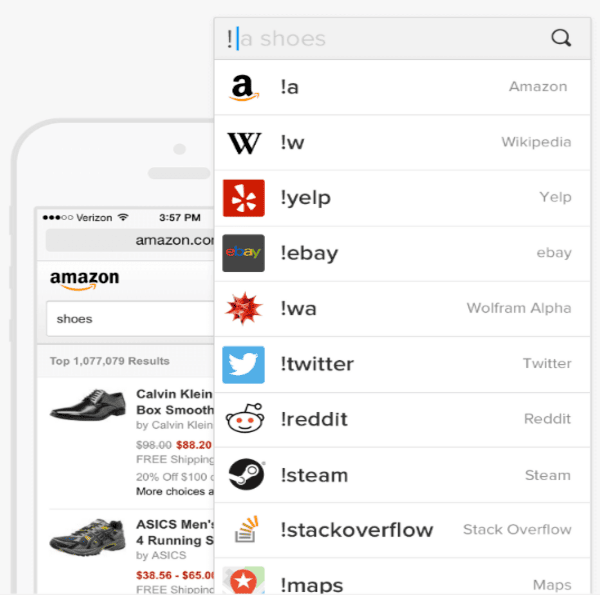
To use Bang!, simply type an exclamation mark (!), followed by the site you want to search. For example, “!amz product name” or “!nf recipe name.”
Here are some of the most used DuckDuckGo Bangs.
- “!gimg:” — used for Google image searches
- “!nf:” — used for Netflix searches
- “!giphy:” — used for Giphy searches
- “!hulu:” — used for Hulu searches
2. Via DuckDuckGo browser extension
You can add DuckDuckGo as an extension to your browser and browse privately. Currently, the extension is available for Google Chrome, Mozilla Firefox, Microsoft Edge, Opera, and Safari.
DuckDuckGo extension installation on Google Chrome:
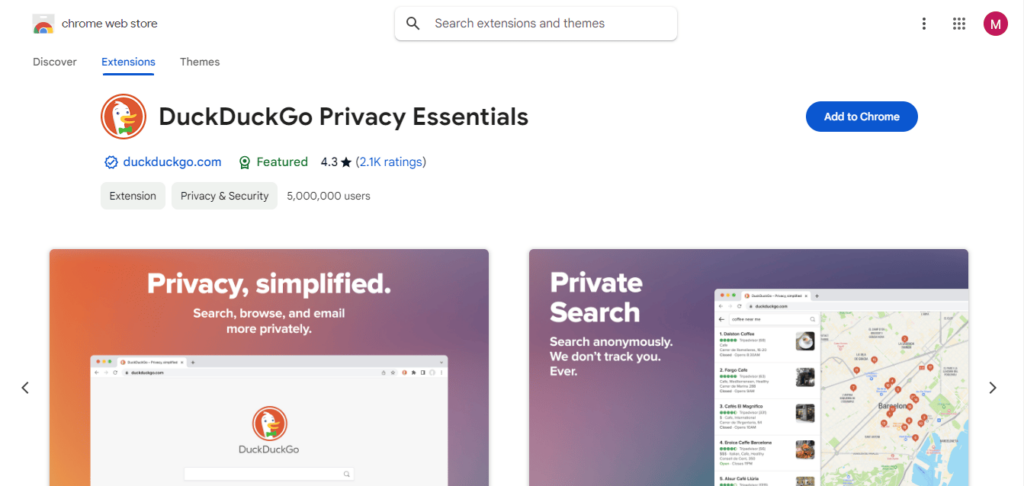
- Visit the Chrome store by clicking this link.
- On the right-hand side of your screen, click “Add to Chrome.”
- Next, click the “Add Extension” option when prompted.
- Wait for DuckDuckGo to download and install in Chrome.
To install the extension in Opera:
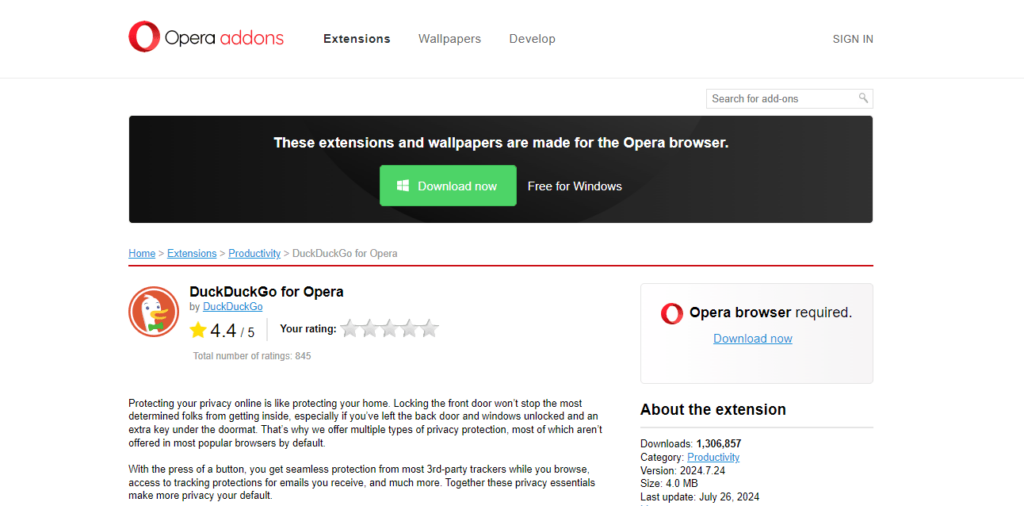
- You can find Opera’s Add-On store by clicking this link.
- Then click the “Download Now” button.
- Please wait for Opera to install DuckDuckGo.
Installing the DuckDuckGo extension in Firefox:
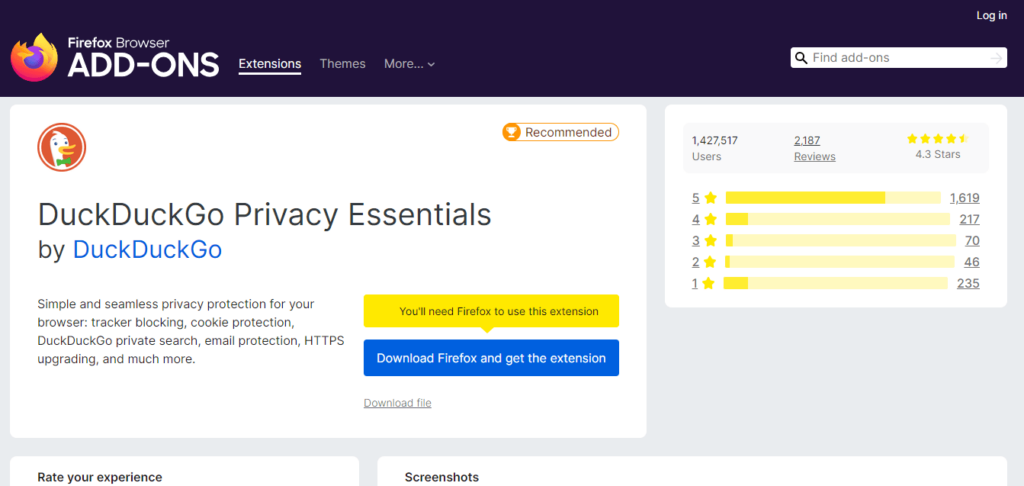
- Find the DuckDuckGo Mozilla add-on through this link.
- Get the extension by clicking “Download.”
- When prompted, click “Confirm.”
The installation process is almost the same for Safari and Microsoft Edge.
3. Using DuckDuckGo mobile apps
DuckDuckGo has mobile apps for both iOS and Android. Mobile apps give you more privacy because they do not share your searches with other apps. Also, the “Fire Button” is much easier to use on mobile apps.
To install on your iOS device:
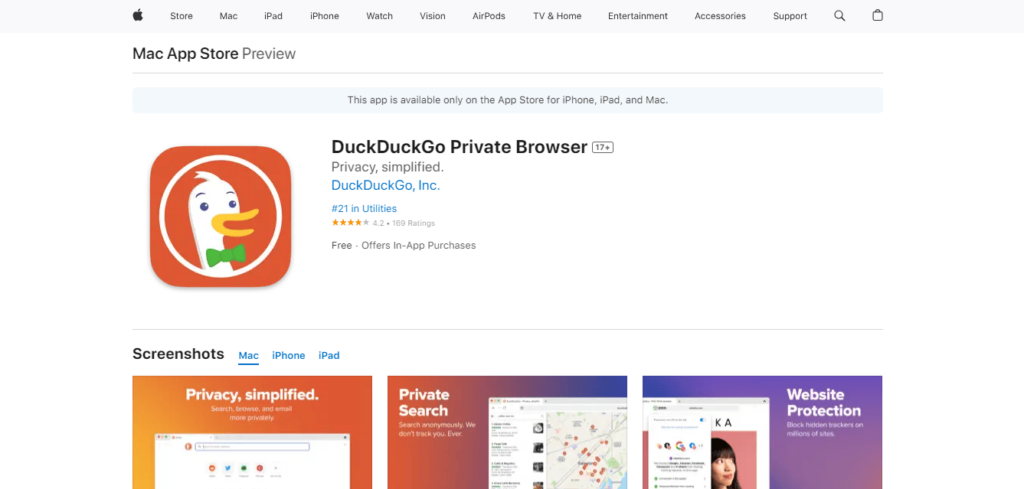
- Go to App Store and type “DuckDuckGo” in the search bar. Alternatively, you can click this link to reach the app page on the App Store.
- Install the app by clicking “Get,” and you are good to go.
To install on your Android device:
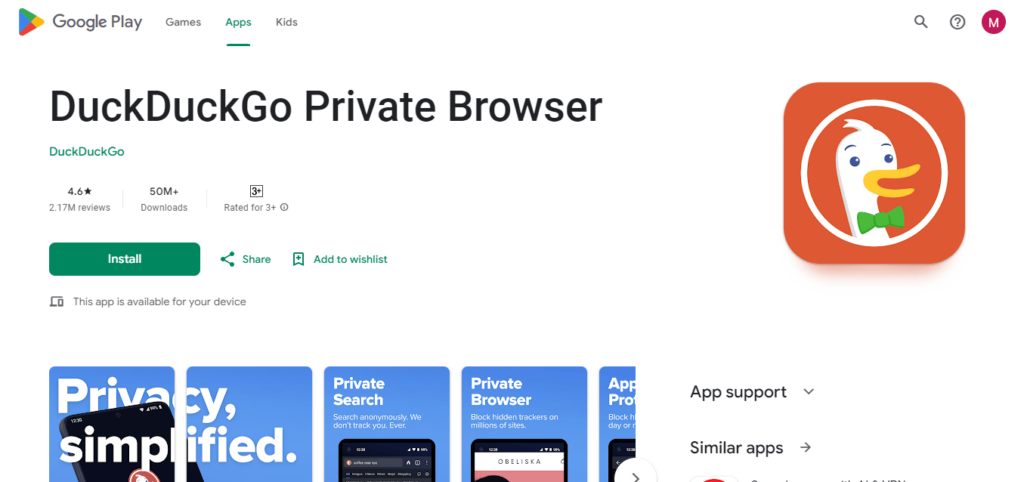
- Go to Play Store and type “DuckDuckGo” in the search bar. Alternatively, you can click this link to reach the Play Store app page directly.
- Install DuckDuckGo by clicking “Install.”
Once the download is complete, open the app and start browsing privately. If you are concerned about every link you open, you can set DuckDuckGo as your default browser.
How does DuckDuckGo make money?
The company earns from keyword advertising, affiliate commissions, and Tracker Radar licensing fees.
DDG’s business model is privacy-first to drive revenue, distinguishing it from competitors such as Google, which uses private data tropes.
Therefore, the company also offers a browser and private email service in addition to its privacy-focused search engine. As a result of the browser, the company can also develop valuable rails. By default, new users are offered a search engine within the browser, which functions as a quasi-marketing tool.
By doing this, DuckDuckGo has several opportunities to launch a privacy product like a VPN or a proxy network, which could make the company more competitive in the long run.
Here are some of the major income sources of DuckDuckGo.
1. Affiliate commission
DuckDuckGo’s revenue primarily comes from affiliate commissions when users click on a product and purchase it.
Several companies, such as Amazon, eBay, and DuckDuckGo, work with DuckDuckGo to promote their products on specific shopping-related keywords.
Whenever a user searches for a shopping keyword, a window pane appears at the top of the page, showing the different products from shopping websites.
Suppose a user clicks on an ad and then makes a purchase within 24 hours (the usual cookie time); DuckDuckGo earns a commission. Some websites even offer affiliate commissions seven days after the user clicks the DuckDuckGo search.
It does not matter whether a user is purchasing the clicked product. Even if they buy another product after click-through DuckDuckGo’s link, DuckDuckGo will still earn a commission. (Not all companies work on this model)
2. Tracker Radar
Tracker Radar provides continuously updated information about Facebook and Google trackers that monitor your online activities. The trackers in this tool can track users’ browsing, shopping, and search activities on the platforms.
Users can use DuckDuckGo’s Tracker Radar to see which tracking platforms watch their online activity and behavior. Notably, consumers have access to all Tracker Radar information at no cost.
The search engine also charges a fee for commercial use of its tracker radar and generates much of its revenue only from here. Companies are willing to pay for data that tells them what users are doing on their platforms so they can better target ads.
Tracker radar is a big revenue generator for DuckDuckGo and is likely to continue to be so.
3. Keyword advertising
As you all know, Google AdWords is the most popular form of keyword advertising. In this type of advertising, advertisers bid on specific keywords relevant to their business.
When a user searches for that keyword, their ad appears on the search results page. DuckDuckGo also uses a similar model for keyword advertising. First, advertisers bid on keywords related to their products or services. Then, when a user searches for that keyword, their ad appears on the search results page.
According to DuckDuckGo, targeted ads aren’t a necessity. Relevance should be determined primarily by the keyword itself. It is common for DuckDuckGo to display multiple ads per query. Up to three ads can appear for some queries, ranked according to the final bid.
The private search engine doesn’t disclose how much it charges for keyword advertising, but the company likely charges a lower rate than Google.
As the service doesn’t keep and share its users’ data, advertisers have less information about the users who see their ads.
Our verdict
DuckDuckGo is an excellent alternative to Google if you are concerned about your privacy. It offers features that other search engines do not have. The service allows you to add it as an extension to your browser or use the mobile app for even more privacy.
We recommend using DuckDuckGo. Although it is not as powerful as Google, it is a good option for day-to-day use if you want to keep your searches private.
FAQs
No, DuckDuckGo is not owned by China. Instead, DuckDuckGo is an American company.
DuckDuckGo does not harvest your personal information as Google does, making it a more private choice. The service also has some unique features like Bang!, making it more fun to use.
No. DuckDuckGo is not a VPN service; it simply does not track you in the same manner as Google does (be aware that even if you use Incognito Mode, your search history is not entirely private).
For safe internet browsing, DuckDuckGo is ideal in combination with a VPN service that encrypts traffic and hides IP addresses.
No, DuckDuckGo is free to use. You can also add the extension to your browser or use the mobile app at no cost.
While DuckDuckGo does not harvest your personal information, we cannot guarantee that your searches are completely private. If you are concerned about your privacy, you can use a VPN to add an extra layer of security.
